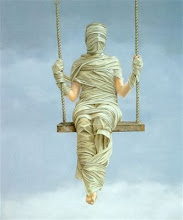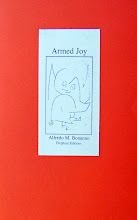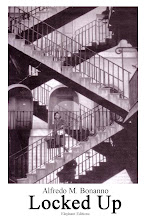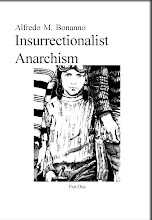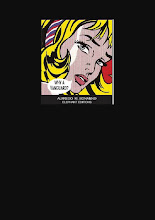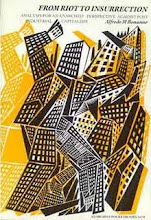Parafulmine e controfigure (cont.)
(by anarchismo collective)
Shots of non-news
* The guerrilla (little war), from communitarian expression of rupture with the values with which power substantiates itself, has been made to degenerate into specialistic social reason of political apparata, and reduced to a military expression of the social unrest. It has thus been able to become the toll with which the autoctone bourgeoisie enter the "heart of power" moving out the managerial classes too prone to foreign (or multinational) Capital.
* The armed struggle ideology is the product of two political mythologies, both democraticist: antifascist resistentialism, and third-worldism with its "national liberations"; are vehicles for the
transformation of forms of power, not their suppression.
* Armed struggle-ism is the continuation of politics with other means.The post-sixtyeight reflux and the failure of the micro-burocracratic groupuscules drowned in the swamp of re-editions of the old tools of the politics of the remote past historically manifested, were not enough to sweep away the contents with which one nourished oneself. These relive in armed struggle-ism.
* armed struggle-ism is, then, a form of struggle that reproposes politics by taking it to the extreme: vanguardism, specialisation, unidimensionality of action, incompleteness, separation. In that it is an
extremicised form, it is not difficult to find in armed struggle facets of many-based politics: armed... reformism, economicism, workerism, feminism, ecologism!
* Is "arming oneself" only a giving a bocca di fuoco to politics, putting a virile prosthesis in the rachitic hands of representation? to love spirits, expectoration of introjected values and ideologies, to get rid of the archaisms of the historical past (of defeat), to overcome the removal, affirm desire, refuse the alienation that makes us things, vibrate with passion, be conductors of life, - in a word invest with our practical critique every reality where one reproduces power and do this without falling into specialised roles, is nothing other than than reproposing politics in the virile and martial form ?
* Sociality sinks its roots in the subjective daily lived, and is the real critique percepibile by each one with all the five senses. Politics are born (and abort) in the economy and in the ritualistic aspect of its merchandise. Man, to find himself, struggles against the logic of the goods that subject him. Politics remains prisoner of the imperative of goods: it can only interfere with the rythms of their production, one doesn’t interrogate oneself on the reasons for its very existence.
* In the world of splitting up and representation, each one makes of (one’s own) partiality globality; every charge of escatological values its chosen role, and looks disdainfully at the rest. Until now there has been who has made of the economy and the productive sphere the main contradiction, pillar, centrality, etc. There is who – in the eternal rsearch for the "new" and revolutionary subject par excellence – has carried out the same operation with the young, women, the marginals, the mad, etc. The armed strugglists consider that their means is the revolutionary one in absolute, and attribute to their practice primary, qualitative superiority, the subversive potential that is greater than all the others.
From when, in the struggle against power that founds its dominion on specialisation and on separation, a practice – partial, reiterated, serial – is superior to the others? Why?
* Capital is not just economy, politics, repression... it is the power of the means of communication, it is spectacle, it is the capacity to represent reality in the way that is most convenient to it, it is the control of science and knowledge... it is psychiatry, the university professor, medicine, the priest, the worker, etc. There exist therefore the contradictions between what one is forced to do (be) and making emerge the human essence denied by Capital/State, but is capable of denying it. The revolutionary movement will affirm itself if it is cabable of facing – and denying – all the contradictions, in extension and profundity, that is every moment of the reproduction of power.
* The equation "anything that is violent = revolutionay", or "the field of illegality = impossibility of recuperation by power", is false. Because it bases itself on counterposition - negation only with one of the prevailing categories or values. Power cannot exist – its code – to connote and give body totally to negation, to that which should destroy it, without remaining in its own field. You don’t deny the carabiniere with the counter-carabiniere, politics with politics, alienation with alienated means.
* The division between the hands (action) and the rest, recalls the more general one between body and mind, limbs and propulsive cerebral centres. It is the reproposition of the counterposition thought/action, intellectual/militant, theoretician/combattent, courage/cowardice, etc. resigned within one’s own reified practice – considered needless to say superior to the others – one ends up keeping oneself distant from radicality, that is from one’s own organic recomposition to find subjectivity. In France, where primacy is given to theory: a plethora of pamphlets, brochures; alienation in writing. In Italy, country of the predominance of practice, succession of gesture-actions (political symbols of negation) repeated obsessively, generalised in time and space to the tuning fork with rythms of the assembly line, the quantitative has been taken as the guiding value: hence the molotov alienation. Two substantially equivalent forms of incompleteness: ideas that never become practice, and practice that never knows how to go beyond itself for its disdain of theory.
* What is an attack? It can be sabotage (if carried out by the producers it is one of the symptoms that announce the proximity of insurrection) or making a breach in a wall. A breach is a breach. But in the scenario of the political spectacle a breach becomes a coded language, a communication by symbols. It can say: we don't agree, we are angry, we want to scare you; but it says it with a symbol that strikes, a symbol of alienation. Moreover, it must also be interpreted!
* At the Turin trial, the young stalinist Franceschini said: "We shoot at the functions, at the togas, if there is a man inside we are sorry...". The debate on the connection and reciprocal determination between function and functionary is ancient, and always resurges from its own ashes. There can be no doubt that a social tumult such as the Russian one that managed to eliminate all the officials (the mechanism-man of the machinery of power), did not manage to overcome the capitalist function, form. And that, for many reasons, not least that which makes the leninists the apologists of industrialisation, and the vehicles of penetration of capital in Asia and Africa, through the liberation fronts. There where a social movement, even partial, has failed, can a stalinist micro-bureaucracy with its cult of maximum spectular action succeed? With its once tragic ideology, today farcical, of stalinism? With its constant negation of sociality of the movement to distort it and assure itself the "political representativity"? For these people the party is everything, the movement is nothing. To shoot a judge is not a critique of law, so much so that they have "people’s" trials, applying "revolutionary" law, exercising "proletarian" justice.
* The discourse on means and ends is still valid. For the materialists, the end is contained in the means, the means are already the end, one is a consequence of the other. A is A, and not A can become, in virtue of faith, B.
* For the armed-strugglists you don’t know whether the production of an event (kneecapping) is more important or the management of it through the mass media to reinforce their "political image" with the proletarians. Sure the access to the means of comunication of power is an alienated way to communicate to the proletarians. In the face of the spectacular event in which few are the active subjects, nothing remains to the others but the passive function, the cheer in favour of or against, identification or not with the operative staff. That it be a question of trade union operators, cultural, or armed struggle-ists is of secondary importance.
The revolution is the abandoning of the spectacle that renders passive, that renders objects, eyes that see images, it is the multiplication of critical subjects capable of always recognising in oneself (and always to the vanguards of the spectacle) the capacity to act, and in a creative way.
* "It is never completely true that the mass are vile or obtuse, when it appears so; it is true that it is never disposed to deceive itself on the useless derring-do or on the separate intelligence of effectiveness. It might identify itself with it by transference, as spectator, and its way of defending itself when it doesn’t really believe in it ".
* For the "masses", obviously, armed strugglism is to the insurrectional rising as premature ejaculation is to the orgasm. Armed strugglism always ends up being the miniaturisation of civil war, its containment, its piloted control. Above all it will reduce itself to the single-purpose expression of the combattent party. This will produce effects that for power are equivalent to the massacre of Ferragosto on the motorways.
* Spectacular violence bases its very criteria on violence, becoming parametre and metre of measure. The more spectacular the violence the more it banalises the infinite violence that each one puts up with in daily life. This ends up pulverising itself, disappearing, seeming minutia of neurotics, reprehensible frustrations. The more one passively puts up with, the more one needs the spectacle of violence to consume in the shadows of survival. The more one abandons the field of the contradictions in daily life, the more politics advances and sociality recedes.
* The logic of the production of commodities is capital’s reason for being. It matters little if these are useful, useless, deadly or enjoyable. It is important that one produces (and consumes), what incorporate in themselves vital energy, that their possession becomes the distinctive trait of man, the scale of values with which to judge him. Up until now the revolutionary movement has stayed within the logic of the production of commodities: it has asked for more money and less work, i.e. let’s produce less, give us more money to consume more. A radical movement must today pose the problem: is the production of this merchandise useful? Man can give himself what he needs by using his own creative intelligence? That is, taking from the worker the character of goods that produce goods, from work the character of alienation and the product that of merchandise. A movement that is capable of imposing its own interests, and that asks itself totally its reasons for what it is constrained to do, can hope at last to realise the liberation from work, and from the destruction that capital has done with nature. In the face of that every ecologist foolish ambition appears in all its misery.
* To make oneself carriers of the happy news of reappropriation is again to endorse goods, it valorises them.
Who – feticist of industrialisation – finding himself excluded from the productive process finds himself theorising reappropriation is a paralytic supporting himself on a crutch hired from power: he does not question the means of capitalist production,does not criticise the worker-commodity because he is a workerist, and he exhorts them to the consumerism of plastic, poisons, noises, devitalising things. They remain debtors of capital. Who reappropriates violently is the close cousin of the other.
["Anarchismo" n. 21, May-June 1978, pp. 156-158]
skip to main |
skip to sidebar

Some writings of Alfredo Maria Bonanno in English, or almost

Alfredo Bonanno was arrested on October 1st 2009 in Greece, accused of concourse in robbery. With him, anarchist comrade Christos Stratigopoulos.
Here are a few translations and part translations of a small portion of Alfredo's writing. This is a work in progress, many of the translations are as yet incomplete. Open links to find more of Alfredo's work.
Alfredo Bonnano Released
Nov. 22 Alfredo Bonnano was sentenced to 4 years imprisonment (which practically means that with the time served so far and the fact that he is over 70years old HE IS RELEASED
Christos Stratigopoulos (who took responsibility for the action)
was sentenced to 8 years and 9 months with the Greek law will probably be released at the end 2011
BY ANY MEANS NECESSARY
LINKS
click on any of these labels to read text
- "Community" sickness
- 1981 - Editorial
- A Critique of Syndicalist Methods
- A few notes on Sacco and Vanzetti
- A few notes on the revolutionary movement in Italy
- A little man in Singapore
- A million jobs
- A question of class
- Affinity
- After Marx autonomy
- Albania Laboratory of Subversion (Introduction)
- Anarchism and the national liberation struggle
- Anarchists and action
- AND WE WILL ALWAYS BE READY TO STORM THE HEAVENS AGAIN (Against amnesty)
- ANTI-INSTITUTIONAL MOVEMENT
- Are we modern?
- Armed Joy
- ARMED STRUGGLE. SOME REFLECTIONS.
- Autonomous base nuclei
- beyond syndicalism
- Beyond workerism
- But what is the imaginary?
- Class War
- Comiso - Organizational document of the self-managed leagues
- Considerations on illegality
- Dissonances (Introduction)
- Elephant Editions 1986
- Excluded and included
- Farewell to claiming
- Feral Revolution (Introduction)
- FICTITIOUS MOVEMENT AND REAL MOVEMENT
- For an Antiauthoritarian Insurrectionist International - Proposal for a debate
- From riot to insurrection
- From the centre to the periphery
- Good technology
- Guerilla Extraordinary
- Habits and idols
- Hegel
- I know who killed chief superintendent Luigi Calabresi
- Illegality
- Illness and capital
- Informal organisation
- Insurrection
- Internationalism
- Introduction to Sabate
- Introduction to Anarchism and Violence
- Introduction to Bratach Dubh English edition of Malatesta's Fra Contadini
- Introduction to Insurrectionalist Anarchism
- Introduction to Strange Victories
- Introduction to The Conquest of Bread
- Involuntary aspects of voluntary work
- Let's destroy work
- LET'S DESTROY WORK. New introduction
- Let's keep our feet on the ground please
- Lightening Conductors and Stand-ins - more shots of non-news
- Lightning Conductors and Stand-ins
- Lightning Conductors and Stand-ins (cont.)
- Locked up
- Looking forward to self-management
- Loss of language
- More on internationalism
- National Liberation Struggle
- nineteen years on
- No more crises
- Non-news about drugs
- Non-news about racism
- Ode to the Uniform
- On Feminism
- One's life on the line
- Order and chaos
- Otto Ruhle (Introductory Note)
- OUR ROLE IN THE PRESENT CONFLICT
- Palestine mon amour
- Pantagruel anarchist review
- Pinelli
- Prison and Prisoners’ Struggles - Introduction
- Propulsive Utopia
- Quality and the factory
- Restructuring Capital and the new democracy
- Revolution - Violence - Antiauthoritarianism
- REVOLUTIONARY VIOLENCE
- Science and the social revolution
- Self-management
- Severino Di Giovanni in Argentina 1923-1931 by Osvaldo Bayer
- Social banditry
- SOME NOTES -
- Space and Capital
- Stirner
- Stop the City? From information to attack
- Strategy and Methods
- Streamlined production
- The "end" of the crisis
- The aesthetics of anarchism
- The anarchist tension
- The area of autonomy and the anarchist movement in Italy
- The armed wing of science
- The Cruise missile base at Comiso can be prevented
- The ethical bank
- The insurrectional project
- THE LANGUAGE OF TECNICS -
- The logic of insurrection
- The moral split
- THE NECESSARY DESTRUCTION -
- The priority of practice
- The refusal of arms
- The revolutionary project
- The revolutionary struggle
- The significance of an insignificant event
- The struggle for self-managed social space
- The tyranny of weakness
- The whole and the part
- The young in a post industrial society
- Theory and action
- Towards anarchist antimilitarism
- TOWARDS THE GENERALISATION OF ARMED STRUGGLE
- TRANSFORMATION IN THE WORLD OF WORK AND SCHOOL -
- TRUTH -
- Unemployment in Italy - How come everything doesn't explode?
- Untitled
- Violence and non-violence
- What are anarchists
- What can we do with anti-fascism?
- Why a vanguard?
- Why Insurrection
- World domination in a few words

